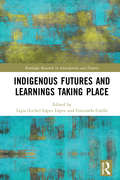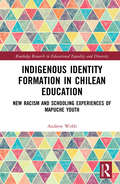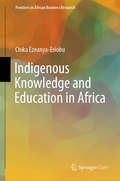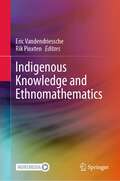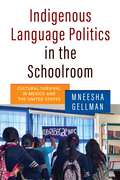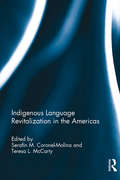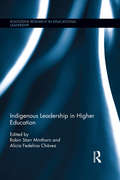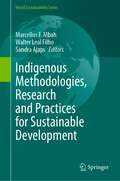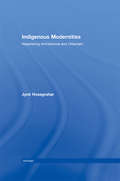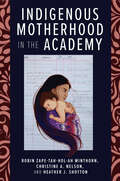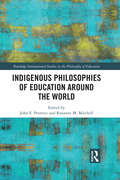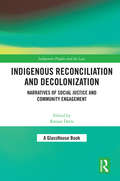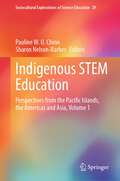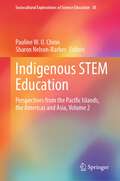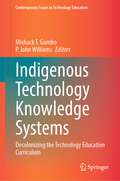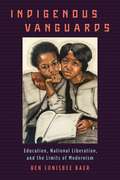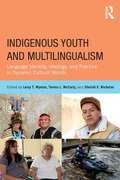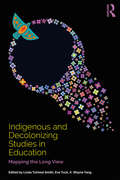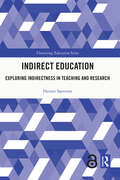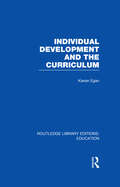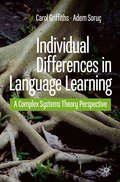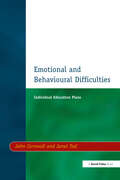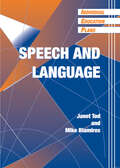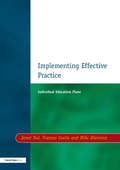- Table View
- List View
Indigenous Futures and Learnings Taking Place (Routledge Research in Anticipation and Futures)
by Ligia López LópezSingularizing progressive time binds pasts, presents, and futures to cause-effect chains overdetermining existence in education and social life more broadly. Indigenous Futures and Learnings Taking Place disrupts the common sense of "futures" in education or "knowledge for the future" by examining the multiplicity of possible destinies in coexistent experiences of living and learning. Taking place is the intention this book has to embody and world multiplicity across the landscapes that sustain life. The book contends that Indigenous perspectives open spaces for new forms of sociality and relationships with knowledge, time, and landscapes. Through Goanna walking and caring for Country; conjuring encounters between forests, humans, and the more-than-human; dreams, dream literacies, and planes of existence; the spirit realm taking place; ancestral luchas; Musquem hən̓q̓əmin̓əm̓ Land pedagogies; and resoluteness and gratitude for atunhetsla/the spirit within, the chapters in the collection become politicocultural and (hi)storical statements challenging the singular order of the future towards multiple encounters of all that is to come. In doing so, Indigenous Futures and Learnings Taking Place offers various points of departure to (hi)story educational futures more responsive to the multiplicities of lives in what has not yet become. The contributors in this volume are Indigenous women, women of Indigenous backgrounds, Black, Red, and Brown women, and women whose scholarship is committed to Indigenous matters across spaces and times. Their work in the chapters often defies prescriptions of academic conventions, and at times occupies them to enunciate ontologies of the not yet. As people historically fabricated "women," their scholarly production critically intervenes on time to break teleological education that births patriarchal-ized and master-ized forms of living. What emerges are presences that undiscipline education and educationalized social life breaking futures out of time. This book will be of great interest to students and scholars of Indigenous studies, future studies, post-colonial studies in education, settler colonialism and coloniality, diversity and multiculturalism in education, and international comparative education.
Indigenous Identity Formation in Chilean Education: New Racism and Schooling Experiences of Mapuche Youth (Routledge Research in Educational Equality and Diversity)
by Andrew WebbThis book offers rich sociological analysis of the ways in which educational institutions influence indigenous identity formation in Chile. In doing so, Webb explores the mechanisms of new racism in schooling and demonstrates how continued forms of exclusion impact minority groups. By drawing on qualitative research conducted with Mapuche youth in schools in rural and urban settings, and in private state-subsidised and public schools, this volume provides a comprehensive exploration of how national belonging and indigeneity are articulated and experienced in institutional contexts. Close analysis of student and teacher narratives illustrates the reproduction of historically constructed ethnic and racial criteria, and demonstrates how these norms persist in schools, despite apparently progressive attitudes toward racism and colonial education in Chile. This critical perspective highlights the continued prevalence of implicit racism whereby schooling produces culturally subjective and exclusionary norms and values. By foregrounding contemporary issues of indigenous identity and education in Chile, this book adds important scholarship to the field. The text will be of interest to researchers, academics, and scholars in the fields of indigenous education, sociology of education, and international and comparative education.
Indigenous Knowledge and Education in Africa (Frontiers in African Business Research)
by Chika Ezeanya-EsiobuThis open access book presents a strong philosophical, theoretical and practical argument for the mainstreaming of indigenous knowledge in curricula development, and in teaching and learning across the African continent. Since the dawn of political independence in Africa, there has been an ongoing search for the kind of education that will create a class of principled and innovative citizens who are sensitive to and committed to the needs of the continent. When indigenous or environment-generated knowledge forms the basis of learning in classrooms, learners are able to immediately connect their education with their lived reality. The result is much introspection, creativity and innovation across fields, sectors and disciplines, leading to societal transformation. Drawing on several theoretical assertions, examples from a wide range of disciplines, and experiences gathered from different continents at different points in history, the book establishes that for education to trigger the necessary transformation in Africa, it should be constructed on a strong foundation of learners’ indigenous knowledge.The book presents a distinct and uncharted pathway for Africa to advance sustainably through home-grown and grassroots based ideas, leading to advances in science and technology, growth of indigenous African business and the transformation of Africans into conscious and active participants in the continent’s progress. Indigenous Knowledge and Education in Africa is of interest to educators, entrepreneurs, policymakers, researchers and individuals engaged in finding sustainable and strategic solutions to regional and global advancement.
Indigenous Knowledge and Ethnomathematics
by Rik Pinxten Eric VandendriesscheThe book presents a series of ethnographic studies, which illustrate issues of wider importance, such as the role of cultural traditions, concepts and learning procedures in the development of formal (or mathematical) thinking outside of the western tradition. It focuses on research at the crossroads of anthropology and ethnomathematics to document indigenous mathematical knowledge and its inclusion in specific cultural patterns. More generally, the book demonstrates the heuristic value of crossing ethnographical, anthropological and ethnomathematical approaches to highlight and analyze—or "formalize" with a pedagogical outlook—indigenous mathematical knowledge.The book is divided into three parts. The first part extensively analyzes theoretical claims using particular ethnographic data, while revealing the structural mathematical features of different ludic, graphic, or technical/procedural practices in their links to other cultural phenomena. In the second part, new empirical studies that add data and perspectives from the body of studies on indigenous knowledge systems to the ongoing discussions in mathematics education in and for diverse cultural traditions are presented. This part considers, on the one hand, the Brazilian work in this field; on the other hand, it brings ethnographic innovation from other parts of the world. The third part comprises a broad philosophical discussion of the impact of intuitive or "ontological" premises on mathematical thinking and education in the light of recent developments within so-called indigenously inspired thinking. Finally, the editors’ conclusions aim to invite the broad and diversified field of scholars in this domain of research to seek alternative approaches for understanding mathematical reasoning and the adjacent adequate educational goals and means.This book is of interest to scholars and students in anthropology, ethnomathematics, history and philosophy of science, mathematics, and mathematics education, as well as other individuals interested in these topics.
Indigenous Language Politics in the Schoolroom: Cultural Survival in Mexico and the United States
by Mneesha GellmanPublic school classrooms around the world have the power to shape and transform youth culture and identity. In this book, Mneesha Gellman examines how Indigenous high school students resist assimilation and assert their identities through access to Indigenous language classes in public schools. Drawing on ethnographic accounts, qualitative interviews, focus groups, and surveys, Gellman’s fieldwork examines and compares the experiences of students in Yurok language courses in Northern California and Zapotec courses in Oaxaca, Mexico. She contends that this access to Indigenous language instruction in secondary schooling serves as an arena for Indigenous students to develop their sense of identity and agency, and provides them tools and strategies for civic, social, and political participation, sometimes in unexpected ways.Showcasing young people’s voices, and those of their teachers and community members, in the fight for culturally relevant curricula and educational success, Gellman demonstrates how the Indigenous language classroom enables students to understand, articulate, and resist the systemic erasure and destruction of their culture embedded in state agendas and educational curricula. Access to Indigenous language education, she shows, has positive effects not only for Indigenous students, but for their non-Indigenous peers as well, enabling them to become allies in the struggle for Indigenous cultural survival. Through collaborative methodology that engages in research with, not on, Indigenous communities, Indigenous Language Politics in the Schoolroom explores what it means to be young, Indigenous, and working for social change in the twenty-first century.
Indigenous Language Revitalization in the Americas
by Serafín M. Coronel-Molina Teresa L. McCartyFocusing on the Americas – home to 40 to 50 million Indigenous people – this book explores the history and current state of Indigenous language revitalization across this vast region. Complementary chapters on the USA and Canada, and Latin America and the Caribbean, offer a panoramic view while tracing nuanced trajectories of "top down" (official) and "bottom up" (grass roots) language planning and policy initiatives. Authored by leading Indigenous and non-Indigenous scholars, the book is organized around seven overarching themes: Policy and Politics; Processes of Language Shift and Revitalization; The Home-School-Community Interface; Local and Global Perspectives; Linguistic Human Rights; Revitalization Programs and Impacts; New Domains for Indigenous Languages Providing a comprehensive, hemisphere-wide scholarly and practical source, this singular collection simultaneously fills a gap in the language revitalization literature and contributes to Indigenous language revitalization efforts.
Indigenous Leadership in Higher Education (Routledge Research in Educational Leadership)
by Robin Minthorn Alicia Fedelina ChavezThis volume offers new perspectives from Indigenous leaders in academic affairs, student affairs and central administration to improve colleges and universities in service to Indigenous students and professionals. It discusses and illustrates ways that leadership norms, values, assumptions and behaviors can often find their origins in cultural identities, and how such assumptions can affect the evolvement of colleges and universities in serving Indigenous Peoples. It contributes to leadership development and reflection among novice, experienced, and emerging leaders in higher education and provides key recommendations for transforming higher education. This book introduces readers to relationships between Indigenous identities and leadership in diverse educational environments and institutions and will benefit policy makers in education, student affairs professionals, scholars, faculty and students.
Indigenous Methodologies, Research and Practices for Sustainable Development (World Sustainability Series)
by Walter Leal Filho Marcellus F. Mbah Sandra AjapsThis book states that whilst academic research has long been grounded on the idea of western or scientific epistemologies, this often does not capture the uniqueness of Indigenous contexts, and particularly as it relates to the achievement of the United Nations Sustainable Development Goals (SDGs). The SDGs were announced in 2015, accompanied by 17 goals and 169 targets. These goals are the means through which Agenda 2030 for sustainable development is to be pursued and realised over the next 15 years, and the contributions of Indigenous peoples are essential to achieving these goals.Indigenous peoples can be found in practically every region of the world, living on ancestral homelands in major cities, rainforests, mountain regions, desert plains, the arctic, and small Pacific Islands. Their languages, knowledges, and values are rooted in the landscapes and natural resources within their territories.However, many Indigenous peoples are now minorities within their homelands and globally, and there is a dearth of research based on Indigenous epistemologies and methodologies. Furthermore, academic research on Indigenous peoples is typically based on western lenses. Thus, the paucity of Indigenous methodologies within mainstream research discourses present challenges for implementing practical research designs and interpretations that can address epistemological distinctiveness within Indigenous communities.There is therefore the need to articulate, as well as bring to the nexus of research aimed at fostering sustainable development, a decolonising perspective in research design and practice.This is what this book wants to achieve. The contributions critically reflect on Indigenous approaches to research design and implementation, towards achieving the sustainable development goals, as well as the associated challenges and opportunities. The contributions also advanced knowledge, theory, and practice of Indigenous methodologies for sustainable development.
Indigenous Methodologies: Characteristics, Conversations, and Contexts, Second Edition
by Margaret KovachIndigenous Methodologies is a groundbreaking text. Since its original publication in 2009, it has become the most trusted guide used in the study of Indigenous methodologies and has been adopted in university courses around the world. It provides a conceptual framework for implementing Indigenous methodologies and serves as a useful entry point for those wishing to learn more broadly about Indigenous research. The second edition incorporates new literature along with substantial updates, including a thorough discussion of Indigenous theory and analysis, new chapters on community partnership and capacity building, an added focus on oracy and other forms of knowledge dissemination, and a renewed call to decolonize the academy. The second edition also includes discussion questions to enhance classroom interaction with the text. In a field that continues to grow and evolve, and as universities and researchers strive to learn and apply Indigenous-informed research, this important new edition introduces readers to the principles and practices of Indigenous methodologies.
Indigenous Modernities: Negotiating Architecture and Urbanism (Architext)
by Jyoti HosagraharThis book examines how a historic and so-called 'traditional' city quietly evolved into one that was modern in its own terms; in form, use and meaning. Through a focused study of Delhi, the author challenges prevalent assumptions in architecture and urbanism to identify an interpretation of modernism that goes beyond conventional understanding. Part one reflects on transformations and discontinuities in built form and spatial culture and questions accepted notions of the static nature of what is normally referred to as traditional and non-Western architecture. Part two is a critical discussion of Delhi in the nineteenth and early twentieth centuries, redefining modernism in a way that separates the city's architecture and society from the objectified realm of the exotic whilst acknowledging non-Western ideas of modernity. In the final part the author considers 'indigenous modernities': the irregular, the uneven and the unexpected in what uncritical observers might call a coherent 'traditional' society and built environment.
Indigenous Motherhood in the Academy
by Heather J. Shotton Charlotte Davidson Stephanie Waterman Christine A. Nelson Kaiwipuni Lipe Pearl Brower Nicole Reyes Miranda Belarde-Lewis Tiffany S. Lee Leola Tsinnajinnie-Paquin Susan Faircloth Nizhoni Chow-Garcia Michelle Johnson-Jennings Alayah Johnson-Jennings Ahnili Johnson-Jennings Dwanna L. McKay Shelly Lowe Tria Blu Wakpa Symphony Oxendine Denise Henning Renée Holt Robin Zape-tah-hol-ah Minthorn Otakuye Conroy-Ben Theresa Gregor Sloan Woska-pi-mi Shotton Erin Kahunawaika?ala WrightIndigenous Motherhood in the Academy highlights the experiences and narratives emerging from Indigenous mothers in the academy who are negotiating their roles in multiple contexts. The essays in this volume contribute to the broader higher education literature and the literature on Indigenous representation in the academy, filling a longtime gap that has excluded Indigenous women scholar voices. This book covers diverse topics such as the journey to motherhood, lessons through motherhood, acknowledging ancestors and grandparents in one’s mothering, how historical trauma and violence plague the past, and balancing mothering through the healing process. More specific to Indigenous motherhood in the academy is how culture and place impacts mothering (specifically, if Indigenous mothers are not in their traditional homelands as they raise their children), how academia impacts mothering, how mothering impacts scholarship, and how to negotiate loss and other complexities between motherhood and one’s role in the academy.
Indigenous Philosophies of Education Around the World (Routledge International Studies in the Philosophy of Education #19)
by John E. Petrovic Roxanne M. MitchellThis volume explores conceptualizations of indigeneity and the ways that indigenous philosophies can and should inform educational policy and practice. Beginning with questions and philosophies of indigeneity itself, the volume then covers the indigenous philosophies and practices of a range of communities—including Sami, Maori, Walpiri, Navajo and Kokama peoples. Chapter authors examine how these different ideals can inform and create meaningful educational experiences for communities that reflect indigenous ways of life. By applying them in informing a philosophy of education that is particular and relevant to a given indigenous community, this study aims to help policy makers and educational practitioners create meaningful educational experiences.
Indigenous Reconciliation and Decolonization: Narratives of Social Justice and Community Engagement (Indigenous Peoples and the Law)
by Ranjan DattaThis book addresses the ethical and practical issues at stake in the reconciliation of Indigenous and non-indigenous communities. An increasing number of researchers, educators, and social and environmental activists are eager to find ways to effectively support ongoing attempts to recognize, integrate and promote Indigenous perspectives and communities. Taking Canada as its focus, this book offers a multidisciplinary consideration of a range of reconciliation policies, practices and initiatives that are relevant in all settler states. Set against its increasing neoliberal appropriation, the book resituates reconciliation in the everyday contexts of community interaction and engagement, as well as in the important areas of Indigenous knowledge, resource management and social and environmental justice. Reconciliation is not just the responsibility of law and government. And, attuned to the different perspectives of settlers, migrants and refugee communities, the book examines areas of opportunity, as well as obstacles to progress, in the forging of a truly decolonizing framework for reconciliation. As the challenges of reconciliation cross numerous academic and substantial areas, this book will appeal to a range of scholars and practitioners working in law, politics, education, environmental studies, anthropology and Indigenous studies.
Indigenous STEM Education: Perspectives from the Pacific Islands, the Americas and Asia, Volume 1 (Sociocultural Explorations of Science Education #29)
by Sharon Nelson-Barber Pauline W. U. ChinnThis book explores ways in which systems of local knowledge, culture, language, and place are foundational for STEM learning in Indigenous communities. It is part of a two-volume set that addresses a growing recognition that interdisciplinary, cross-cultural and cross-hybrid learning is needed to foster scientific and cultural understandings and move STEM learning toward more just and sustainable futures for all learners. Themes of learning from elders, through practice and place-based experiences are found across cultures. Each chapter brings a uniquely Indigenous point of view to the educational transformation efforts taking place in these distinct contexts. In the second section the chapters use authentic research stories to explain many ways in which regular disciplinary policies and practices can impact Indigenous students’ participation in STEM classrooms and careers. These authors go on to discuss ways to engage learners in STEM activities that are interconnected with the contexts of their lives.
Indigenous STEM Education: Perspectives from the Pacific Islands, the Americas and Asia, Volume 2 (Sociocultural Explorations of Science Education #30)
by Sharon Nelson-Barber Pauline W. U. ChinnThis book builds upon the range of Indigenous theory and research found in Volume I and applies these learnings to interventions in schools, communities, teacher education and professional development. It is part of a two-volume set addresses a growing recognition that interdisciplinary, cross-cultural and cross-hybrid learning is needed to foster scientific and cultural understandings and move STEM learning toward more just and sustainable futures for all learners. Authors working in Eurocentric settings of schools and colleges—whether in the continental or island United States, Canada, Thailand, Taiwan or Chuuk—utilize storytelling, place, language and experiential learning to engage students in meaningful, highly contextualized study that honors ancestral knowledge and practices. They recognize that their disciplines have been structured and colonized by Eurocentric/American frameworks that lack storied, ethical contexts developed through living sustainably in particular places. Recognizing that students seeking to enter STEM majors and careers now must be knowledgeable in multiple ways, authors describe innovative ways to immerse precollege learners as well as developing and practicing teachers in settings that intersect culture, place, heritage language, and praxis that enable Indigenous and local knowledge to become central to learning. Twenty-first century technologies of distance learning, digital story-telling, and mapping technologies now enable formerly marginalized, minoritized groups to share their worldviews and systems of knowledge.
Indigenous Technology Knowledge Systems: Decolonizing the Technology Education Curriculum (Contemporary Issues in Technology Education)
by P. John Williams Mishack T. GumboThere has been a growing interest in indigenous knowledge systems and research. This interest has been mainly triggered by the need to decolonize education as a response to the colonial onslaught on indigenous knowledge and people. Research has, however, concentrated on the generality of the indigenous knowledge system rather than on its related dimensions. One area that has suffered a lack of attention is indigenous conceptions of science, technology, engineering, and mathematics (STEM) despite the unquestionable evidence of STEM in indigenous contexts. Most STEM is presented by colonial establishments and representations, especially in developed/modern/urban contexts, which portray STEM as a colonial construct. This book focuses on indigenous technological knowledge systems education (ITKSE). Indigenous people have been at the front of technological developments from pre-colonial times. The list of precolonial industries, science, and technology is extensive, including blacksmithing, wood-carving, textile-weaving and dyeing, leather works, beadworks, pottery making, architecture, agricultural breeding, metal-working, salt production, gold-smithing, copper-smithing, leather-crafting, soap-making, bronze-casting, canoe-building, brewing, glass-making, and agriculture, for example. In some parts of the world such as Africa and Australia, these technologies still exist. ITKSE should not be left to exist outside of the technology education curriculum and classroom as it can benefit both indigenous students, who have been denied learning about what is relevant to them, and non-indigenous students. These cultural groups can expand their knowledge of technology by learning both ITKSE and Western technological knowledge systems education (WTKSE). ITKSE also presents opportunities for technology teachers to reflect on and revisit their depth of technological knowledge, pedagogies, and assessment. The intent of this book is transformational in the sense that it brings decolonial and indigenous perspectives into the technology education context. It extends technology education in the sense that it will not only influence Western-minded architects, artisans, designers, etc. but encourage indigenous-mindedness as well.
Indigenous Vanguards: Education, National Liberation, and the Limits of Modernism (Modernist Latitudes)
by Ben Conisbee BaerAnticolonial struggles of the interwar epoch were haunted by the question of how to construct an educational practice for all future citizens of postcolonial states. In what ways, vanguard intellectuals asked, would citizens from diverse subaltern situations be equally enabled to participate in a nonimperial society and world? In circumstances of cultural and social crisis imposed by colonialism, these vanguards sought to refashion modern structures and technologies of public education by actively relating them to residual indigenous collective forms.In Indigenous Vanguards, Ben Conisbee Baer provides a theoretical and historical account of literary engagements with structures and representations of public teaching and learning by cultural vanguards in the colonial world from the 1920s to the 1940s. He shows how modernizing educative projects existed in complex tension with impulses to indigenize national liberation movements, and how this tension manifests as a central aspect of modernist literary practice. Offering new readings of figures such as Alain Locke, Léopold Senghor, Aimé Césaire, D. H. Lawrence, Rabindranath Tagore, Mahatma Gandhi, and Tarashankar Bandyopadhyay, Baer discloses the limits and openings of modernist representations as they attempt to reach below the fissures of class that produce them. Establishing unexpected connections between languages and regions, Indigenous Vanguards is the first study of modernism and colonialism that encompasses the decisive way public education transformed modernist aesthetics and vanguard politics.
Indigenous Youth and Multilingualism: Language Identity, Ideology, and Practice in Dynamic Cultural Worlds
by Teresa L. McCarty Leisy T. Wyman Sheilah E. NicholasBridging the fields of youth studies and language planning and policy, this book takes a close, nuanced look at Indigenous youth bi/multilingualism across diverse cultural and linguistic settings, drawing out comparisons, contrasts, and important implications for language planning and policy and for projects designed to curtail language loss. Indigenous and non-Indigenous scholars with longstanding ties to language planning efforts in diverse Indigenous communities examine language policy and planning as de facto and de jure – as covert and overt, bottom-up and top-down. This approach illuminates crosscutting themes of language identity and ideology, cultural conflict, and linguistic human rights as youth negotiate these issues within rapidly changing sociolinguistic contexts. A distinctive feature of the book is its chapters and commentaries by Indigenous scholars writing about their own communities. This landmark volume stands alone in offering a look at diverse Indigenous youth in multiple endangered language communities, new theoretical, empirical, and methodological insights, and lessons for intergenerational language planning in dynamic sociocultural contexts.
Indigenous and Decolonizing Studies in Education: Mapping the Long View (Indigenous and Decolonizing Studies in Education)
by Eve Tuck Linda Tuhiwai Smith K. Wayne YangIndigenous and decolonizing perspectives on education have long persisted alongside colonial models of education, yet too often have been subsumed within the fields of multiculturalism, critical race theory, and progressive education. Timely and compelling, Indigenous and Decolonizing Studies in Education features research, theory, and dynamic foundational readings for educators and educational researchers who are looking for possibilities beyond the limits of liberal democratic schooling. Featuring original chapters by authors at the forefront of theorizing, practice, research, and activism, this volume helps define and imagine the exciting interstices between Indigenous and decolonizing studies and education. Each chapter forwards Indigenous principles - such as Land as literacy and water as life - that are grounded in place-specific efforts of creating Indigenous universities and schools, community organizing and social movements, trans and Two Spirit practices, refusals of state policies, and land-based and water-based pedagogies.
Indirect Education: Exploring Indirectness in Teaching and Research (Theorizing Education)
by Herner SaeverotIndirect Education discusses direct and indirect pedagogies, and the complexities of these concepts within the field of education practice and research. It addresses the question of when it is most beneficial to be indirect with regards to teaching and educational research. The book offers an original approach to education in how it reasserts our right to a sense of ownership and agency in educational explorations. It argues that there should be space for indirect ways of teaching and communication when matters without clear answers and objectives enter the educational sphere. Bringing together a mix of empirical studies presented with a degree of story-telling, the book explores the literature of educational theory to make a novel and relatable argument for making space for indirectness in learning contexts. Putting forward a compelling case that is necessary to education in the difficult times that we are living in, the book will appeal to academics, researchers and students in the fields of educational theory, pedagogy, leadership studies and educational practice.
Individual Development and the Curriculum (Routledge Library Editions: Education)
by Kieran EganThis book describes four ‘layers’ or stages of education – Mythic, Romantic, Philosophic and Ironic and shows how children at each stage most effectively learn, and how they can be helped towards educational maturity. While drawing on a wide range of philosophical and psychological literature, this new theory is primarily constructed from close observation of children in their common and intense imaginative engagements, and in everyday educational practice.
Individual Differences in Language Learning: A Complex Systems Theory Perspective
by Carol Griffiths Adem SoruçThis textbook takes a Complex Systems Theory approach to examine individual differences between learners and the potential impact of these variables on the process of acquiring a second language. The authors argue that individual variables cannot provide the complete picture, and that they must instead be understood as part of an interconnected and dynamic system of different factors in order to be useful in a language learning context. Written in an accessible style and suitable for final-year undergraduate and Masters-level students, the book includes clear definitions of key terms, discussion questions for classroom use, practical exercises and activities, and examples of real empirical studies that students and teachers can replicate in their own contexts. This textbook will be of interest to students taking TESOL and SLA courses and modules, as well as those on broader Applied Linguistics programmes.
Individual Education Plans (IEPs): Emotional and Behavioural Difficulties
by Janet Tod John CornwallFirst published in 1998. Routledge is an imprint of Taylor & Francis, an informa company.
Individual Education Plans (IEPs): Speech and Language
by Janet Tod Mike BlamiresFirst published in 1999. Routledge is an imprint of Taylor & Francis, an informa company.
Individual Education Plans Implementing Effective Practice
by Janet Tod Mike Blamires Francis CastleFirst Published in 1998. Routledge is an imprint of Taylor & Francis, an informa company.
